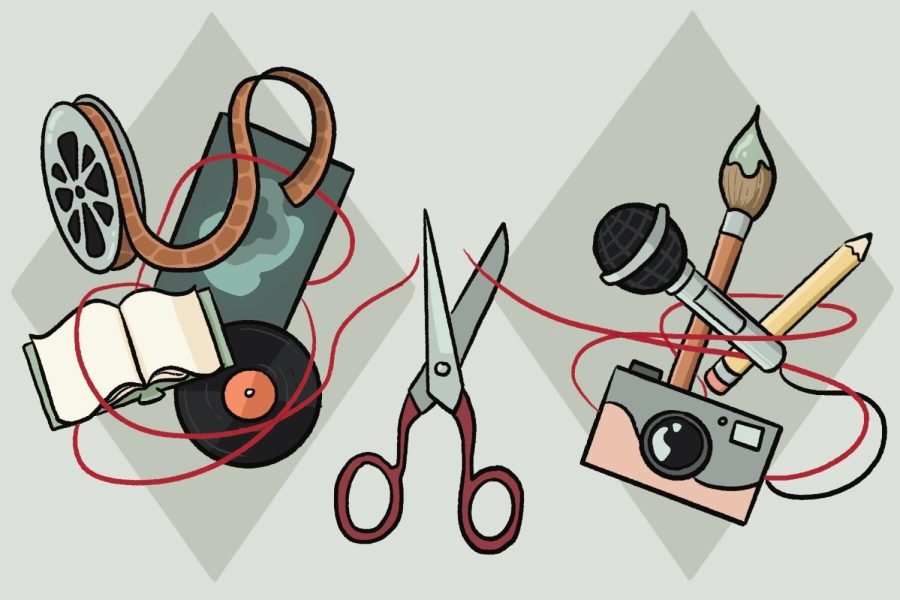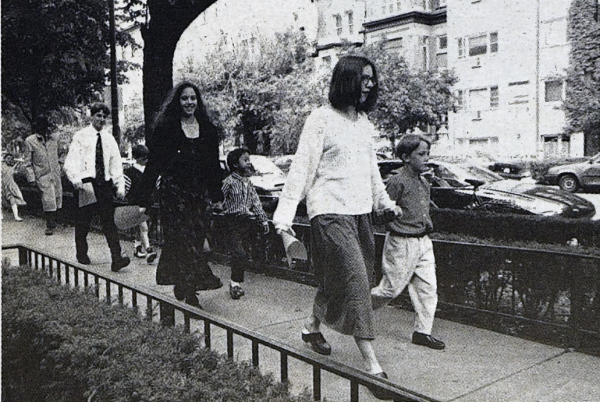Separating Art From the Artist: Where Should We Draw the Line?
illustration via studybreaks.com
Harry Potter, the globally beloved children’s book series that eventually developed into its own magical world, was written by J.K. Rowling, who has been accused of making transphobic remarks and antisemitic stereotyping in her novels. Separately, over 100 films, from childhood favorites to critically acclaimed modern classics, were produced by Harvey Weinstein, a convicted sex offender. And, most recently, Chicago’s own rapper, singer, and songwriter, Kanye West, both tweeted and spoke out about his radically antisemitic beliefs.
Kanye’s actions not only caused outrage but also posed a difficult yet important question: Can we separate Kanye’s music and content from his actions? And, more broadly, can we separate the content we enjoy from the people who make it?
On October 8, Kanye tweeted that he wanted to “go death con 3 on JEWISH PEOPLE.” Twitter subsequently removed the tweet for violating the platform’s guidelines, and Kanye’s account was restricted. Once his account was reactivated, he tweeted a picture of a swastika inside of a Jewish star, and his account was suspended once again.
On December 1, Kanye appeared on far-right conspiracy theorist Alex Jones’ podcast. He said, “I see good things about Hitler,” among other antisemitic and Holocaust-denying remarks. Many companies that Kanye had worked with in the past, including Balenciaga, Adidas, and Gap, cut off all ties with the rapper in light of his antisemitic comments.
In response to the controversy, Latin students distanced themselves from Kanye’s content to varying degrees. Sophomore Emily Goodman said, “I took all of [Kanye’s] songs out of my playlist because I’m Jewish and everything that was said was really bad.”
Sophomore Michael Gray shared a different perspective, saying, “I think that especially in today’s society, it’s extremely difficult to separate artist from art, and unfortunately, a lot of great artists and inventors are antisemitic.”
“I’d still ride in a helicopter or drink Fanta even though it was invented by the Nazis,” Michael said. “I’ll still drive a Ford car even though Henry Ford was a raving antisemite. I feel as though as long as what you choose to platform doesn’t bring light to hate speech, nor publicly display it, it’s all good.”
Director of Academic Initiatives and Upper School history teacher Ingrid Dorer, when posed with the question above, said, “This is an incredibly nuanced and complex question. There is a lot of work and body of music historically that we find exceptional, where we do in fact separate, to a large extent, the creator and let [the art] stand on its merits. I don’t have a clear-cut answer.”
Ms. Dorer also stressed the difference between expressing controversial beliefs and promoting hate speech. “People who want to use their platform for explicit hate messages? I have zero patience for that,” she said.
Kanye’s recent controversy also allowed people to think more critically about where the art and media they consume comes from. Emily said, “Now when I’m listening to music, I’m more aware of where it’s coming from, and I try to support things that come from somebody whose actions I agree with.”
However, there can be drawbacks to canceling out art and media because you disagree with the views of the creator. Ms. Dorer said, “If we are too quick to reach judgment, the problem is that we also encourage a lot of single stories.” Single stories, a term coined by author Chimamanda Ngozi Adichie, occur when only one perspective of a topic, story, or group of people is shared. Single stories can lead to detrimental polarization and stereotyping.
Another conversation that controversy surrounding famous artists and storytellers has propelled is cancel culture. This phenomenon, although often warranted and even necessary, can also lead to polarization and in-group bias. In-group bias is the tendency to favor one’s own group, such as only trusting and digesting information that comes from a particular perspective.
Ms. Dorer said, “Can we look at something separately from the person who created it and the views that created it? There was a time when that was a lot easier because our access to information about people and things that they may have said was more limited, especially now with social media soundbites, like what we see on Twitter.” She added, “You can see a lot more of somebody’s maybe not well-thought-out comments, and it’s very difficult because that information spreads so quickly.”
To combat single stories and rampant hate messages, Latin students and faculty must continue to have these complex conversations, and pay closer attention to what they are supporting and consuming.
Michael Schur, a television producer and writer of many beloved comedies, including The Good Place and Parks and Recreation, discussed this topic in his recent book: How to be Perfect. He wrote, “People who want to avoid this thorny issue like to say, ‘Where do we draw the line?!’ as if merely pointing out its blurriness absolves us from trying to bring it into focus. But as the comedian John Oliver likes to say: ‘Somewhere.’ We draw it Somewhere. You and I may draw it in different places, but we need to draw it, for each of us, for ourselves.”

Natasha Benjamin (‘25) is delighted to serve as an opinions editor this year! This is her fourth and final year writing for The Forum, and she loves...




















































